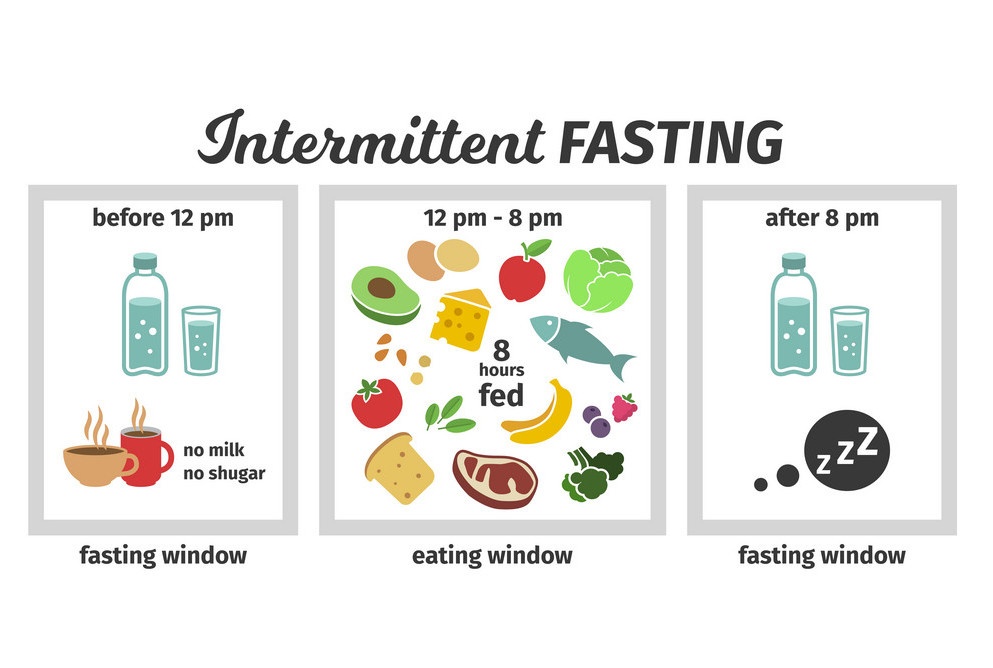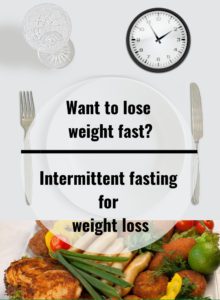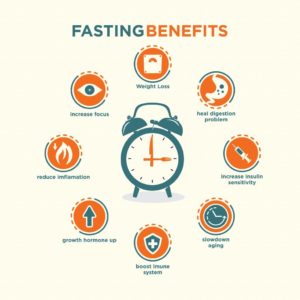
Intermittent fasting boosts health by strengthening daily rhythms
- October 13, 2020
- 1 Like
- 983 Views
- 0 Comments
Intermittent fasting as a health and weight loss approach has been around in various forms for ages. Based on recent studies, intermittent fasting makes intuitive sense. The food we eat is broken down by enzymes in our gut and eventually ends up as molecules in our bloodstream. Carbohydrates, particularly sugars and refined grains (think white flours and rice), are quickly broken down into sugar, which our cells use for energy. If our cells don’t use it all, we store it in our fat cells as, well, fat. But sugar can only enter our cells with insulin, a hormone made in the pancreas. Insulin brings sugar into the fat cells and keeps it there. Between meals, as long as we don’t snack, our insulin levels will go down and our fat cells can then release their stored sugar, to be used as energy. We lose weight if we let our insulin levels go down. The entire idea of intermittent fasting is to allow the insulin levels to go down far enough and for long enough that we burn off our fat.
Fasting is evolutionarily embedded within our physiology, triggering several essential cellular functions. Flipping the switch from a fed to fasting state does more than help us burn calories and lose weight. The researchers combed through dozens of animal and human studies to explain how simple fasting improves metabolism, lowering blood sugar; lessens inflammation, which improves a range of health issues from arthritic pain to asthma; and even helps clear out toxins and damaged cells, which lowers risk for cancer and enhances brain function.

It’s important to check with your doctor before starting intermittent fasting. Once you get his or her go-ahead, the actual practice is simple. You can pick a daily approach, which restricts daily eating to one six- to eight-hour period each day. For instance, you may choose to try 16/8 fasting: eating for eight hours and fasting for 16.
Another, known as the 5:2 approach, involves eating regularly five days a week. For the other two days, you limit yourself to one 500–600 calorie meal. An example would be if you chose to eat normally on every day of the week except Mondays and Thursdays, which would be your one-meal days.
Longer periods without food, such as 24, 36, 48 and 72-hour fasting periods, are not necessarily better for you and may be dangerous. Going too long without eating might actually encourage your body to start storing more fat in response to starvation.
Mattson’s research shows that it can take two to four weeks before the body becomes accustomed to intermittent fasting. You might feel hungry or cranky while you’re getting used to the new routine. But, he observes, research subjects who make it through the adjustment period tend to stick with the plan, because they notice they feel better.

- Thinking and memory. Studies discovered that intermittent fasting boosts working memory in animals and verbal memory in adult humans.
- Heart health. Intermittent fasting improved blood pressure and resting heart rates as well as other heart-related measurements.
- Physical performance. Young men who fasted for 16 hours showed fat loss while maintaining muscle mass. Mice who were fed on alternate days showed better endurance in running.
- Diabetes and obesity. In animal studies, intermittent fasting prevented obesity. And in six brief studies, obese adult humans lost weight through intermittent fasting.
- Tissue health. In animals, intermittent fasting reduced tissue damage in surgery and improved results.

The good and the bad. The same applies to eating and fasting. Fasting, after all, is simply the flip side of eating. If you are not eating, you are fasting. Previous studies have shown that If we start eating the minute we roll out of bed and do not stop until we go to sleep, we spend almost all our time in the fed state. Over time, we may gain weight because we have not allowed our body any time to burn stored food energy. To restore balance or to lose weight, we may simply need to increase the amount of time spent burning food energy. It’s important to note that fasting differs from starvation in a crucial way. Starvation is the involuntary absence of food for a long time. This can lead to severe suffering or even death. It’s neither deliberate nor controlled. Hence food is easily available, but you choose not to eat it. At its very core, intermittent fasting simply allows the body to use its stored energy, by burning off excess body fat. It is important to realise that this is normal and human have evolved through fasting for shorter time periods (hours/days) without detrimental health consequences.

In essence, intermittent fasting allows the body to use its stored energy. The important thing to understand is that there is nothing wrong with that. That is how our bodies are designed. That’s what dogs, cats, lions and bears do. That’s what humans do.



Leave Your Comment